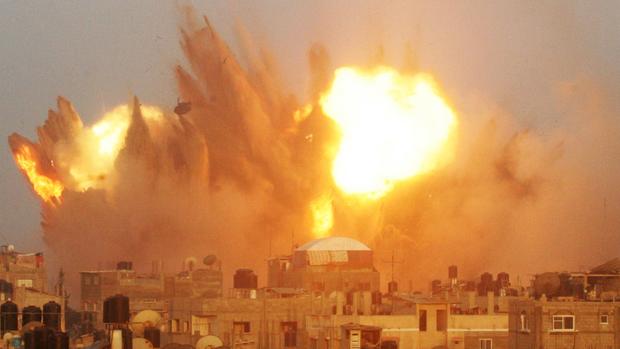Israel's ground offensive in Gaza takes first lives
JERUSALEM -- Israel on Friday announced its first casualty since the start of its ground operation in Gaza -- a soldier killed following a night of heavy fighting in the Hamas-ruled enclave.
The military said he was killed in the northern Gaza Strip, but the circumstances behind his death were not immediately clear. Hamas' military wing said it ambushed Israeli units in the northern town of Beit Lahiya and caused casualties, but Israeli media said it was likely a case of friendly fire between Israeli troops.
Gaza health officials said 19 Palestinians have been killed since the ground operation began late Thursday. Thr was on word on whether any civilians were among them.
Israel intensified its 11-day campaign against Gaza's Hamas rulers by launching a ground operation late Thursday after becoming increasingly exasperated with unrelenting rocket fire from Gaza on its cities, especially following Hamas' rejection of an Egyptian cease-fire plan earlier in the week.
Israel's chief military spokesman, Brig. Gen. Moti Almoz, told Army Radio there "were a number of points of friction through the night" and said the military was investigating the circumstances behind the soldier's death.
In a statement, the military said it killed 14 militants in a number of exchanges of fire. It targeted rocket launchers, tunnels and more than 100 other targets. The military said some 20 concealed rocket launchers have been destroyed during the incursion.
In Gaza City, plumes of black smoke could be seen rising from areas near the border with Israel, and explosions could be heard throughout the city.
"The sky here in Gaza has been lit up over and over again as Israel pounds this tiny land with airstrikes," CBS News correspondent Holly Williams said.
In Istanbul, Turkey, riot police fired tear gas and water cannon Friday to disperse demonstrators who threw rocks at the Israeli consulate to protest Israel's ground offensive in Gaza, the Reuters news agency cites local media as reporting.
The military said 50 rockets have been fired at Israel since the start of its ground operation, out of more than 1,500 since the fighting began last week.
Israeli aircraft have struck more than 2,000 targets in Gaza. More than 260 Palestinians have been killed in the air and naval campaign. An Israeli civilian was killed earlier this week.
Israel said it launched an open-ended assault on several fronts, with the primary aim being to destroy underground tunnels into Israel built by Hamas that could be used to carry out attacks and smuggle weapons.
Earlier Thursday, 13 heavily armed Hamas militants had tried to sneak into Israel through such a tunnel, but were stopped by an airstrike after they emerged some 800 feet inside Israel, the military said.
Israeli officials have said the goal is to weaken Hamas militarily and have not addressed the possibility of driving the Islamic militants from power. However, Hamas has survived Israeli offensives in the past, including a major ground operation in January 2009 from which it emerged militarily weaker, but then recovered. Hamas has since assembled thousands of rockets and built a system of underground bunkers.
Israel has been reticent about launching a ground offensive for fear of endangering its own soldiers and drawing international condemnation if more Palestinian civilians are killed.
But Israeli public opinion appears to strongly support the offensive after days of unrelenting rocket fire from Gaza and years of southern Israeli residents living under the threat.
As the ground operation was announced, a statement from Israeli Prime Minister Benjamin Netanyahu's office said, ""In light of the despicable and relentless aggression by Hamas and the dangerous infiltration into Israel, Israel is obliged to protect its citizens."
Shortly after the offensive began, Hamas spokesman Faouzi Barhoum told CBS News it was a "serious escalation" and vowed that Israel would "pay dearly."
"Hamas is ready for a confrontation," he said.
Secretary of State John Kerry spoke to Netanyahu by phone and "emphasized the need to avoid further escalation," the State Department said in a statement.
At the United Nations, Secretary-General Ban Ki-moon said he regretted that the "already dangerous conflict has now escalated even further."
"I urge Israel to do far more to stop civilian casualties," he said. "There can be no military solution to this conflict."
Jordan, the Arab representative on the U.N. Security Council, called for an emergency meeting but no time has been set.
